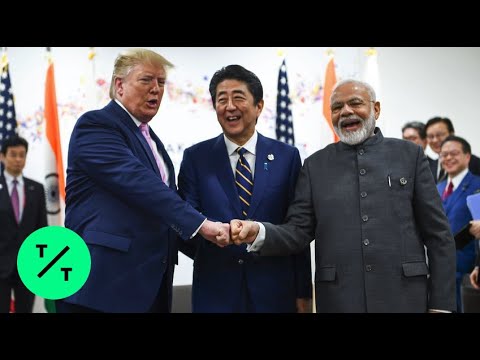All the early statements and gossip in Osaka revolve around the year-long China-US dispute
Gordon WATTS
Two words were on the lips of world leaders as the curtain went up on the Group of 20 gathering in the Japanese city of Osaka. On Friday, all the early statements and gossip revolved around the "trade war."
Xi Jinping set the tone. China's president warned about the dangers of protectionism at a meeting between the BRICS bloc of Brazil, Russia, India, China and South Africa.
"This is destroying the global trade order... This also impacts the common interests of our countries, overshadows the peace and stability worldwide," the Chinese president said.
While he did not directly refer to the United States, his message was clear and unequivocal.
In the past year, Washington and Beijing have been embroiled in a brutal trade conflict involving tit-for-tat tariffs on imports worth hundreds of billions of dollars. Along the way, Chinese companies, such as the telecoms giant Huawei, have been dragged into the dispute, suffering punitive sanctions imposed by Washington.
After trade talks broke down last month and the technology battle intensified between the world's two largest economies, the shockwaves rippled across the globe.
Now, G20 leaders are praying that US President Donald Trump and Xi can ease tensions when they meet face-to-face on Saturday to discuss the situation.
Although there appears little chance of an immediate deal, they will be hoping a truce can be hammered out.
Trump at least made all the right noises about trade agreements. But they did not appear to include China.
'Very big deal'
"I think we're going to have some very big things to announce. Very big trade deal. We're doing some very big things with India in terms of trade, in terms of manufacturing," he said at the start of talks with Indian Prime Minister Narendra Modi.
The only real reference about the spat with Beijing came in a remark he also made to Modi.
"We actually sell Huawei many of its parts," Trump said. "So we're going to be discussing that and also how India fits in. And we'll be discussing Huawei."
Earlier this week, media reports suggested that Xi would not agree to a deal unless Washington lifted its ban on the company, which is recognized as a world leader in 5G technology and a key player in the smartphone sector.
During the opening session, Trump touched on the issue. "We must also ensure the resilience and security of our 5G networks," he said.
Still, Sino-American trade fiction dominated the conversation after the World Bank released a report earlier this month entitled, Global Economic Prospects: Heightened Tensions, Subdued Investment.
"The trade relations between China and the United States are difficult, they are contributing to the slowdown of the global economy," Jean-Claude Juncker, the outgoing European Commission president, told a media briefing.
French President Emmanuel Macron also called for a reset in relations between Washington and Beijing to get the "global economy" back on track.
"Today things are made neither in China nor in the United States. They are made globally," he said.
In his opening address, Shinzo Abe, the Japanese prime minister, appealed for unity among bickering nations as well as later touching on the thorny problem of reforming the World Trade Organisation or WTO.
He urged G20 leaders to send a strong message in support of free and fair trade, warning that geopolitical tensions were rising and buffeting the "global economy."
"With your help, I hope we will realize beautiful harmony in Osaka... rather than highlight our confrontations, let us seek out what unites us," he said.
"Today, I want to discuss with leaders measures to further enhance momentum towards reform in WTO," he added.
Eloquent sentiments amid the rhetoric of what is looking like a new economic Cold War between China and the US.
Indeed, the temperature plunged another few degrees before the opening address at the G20.
"Bullying practices are on the rise, posing severe threats to economic globalization and international order, and severe challenges to the external environment of developing countries," Dai Bing, an official from China's Ministry of Foreign Affairs, said in a veiled attack on Washington's stance.
Yet behind the scenes, Beijing's top trade negotiator Vice-Premier Liu He and US Trade Representative Robert Lighthizer met at the Imperial Hotel in Osaka, according to an official familiar with the matter who declined to be identified, Bloomberg news agency revealed.
They were trying to lay the groundwork for the Trump-Xi tete-a-tete.
Australia's Prime Minister Scott Morrison, who dined with the US president on Thursday, illustrated the challenges ahead.
"I walked away with the view that this is going to be tough because there are some very serious issues that they're trying to resolve," he told Channel 7, the Australian television network.
But then, walking away has been a specialty in the year-long diplomatic confrontation.
